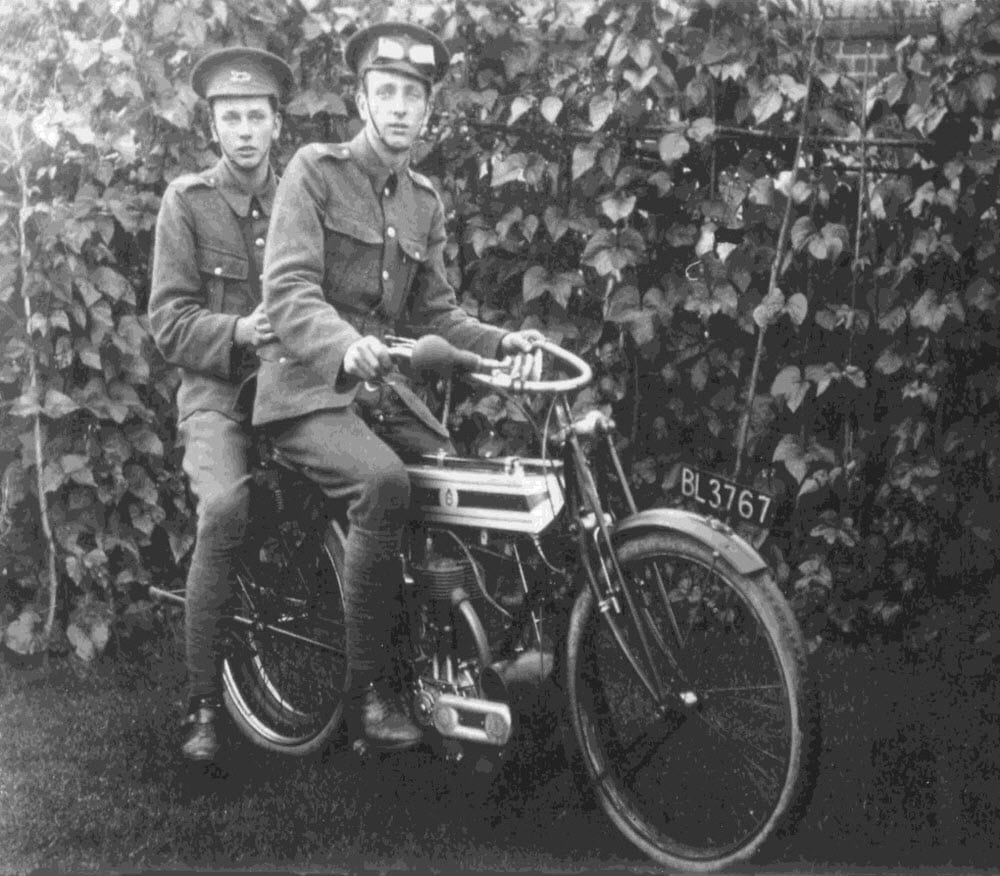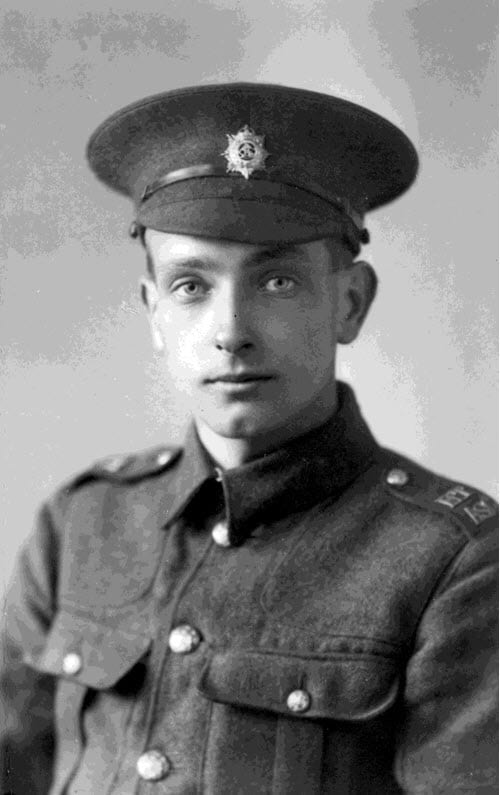Britain in August 1914 at the onset of a great land war had an army with only about 70,000 full-time operationally-ready troops. Germany’s army had an equivalent strength of some 350,000. Kitchener, the newly-appointed Secretary of State for War, called upon the fit young men of the country to volunteer. Brothers James and Charles Butler (familiarly known as Jim and Charlie) both responded in early 1915 to this call to arms and volunteered for army service. Jim, who was born 61897, was then 17 and Charlie, born 71899, was 15. They were amongst some 2½ million men who joined the British army voluntarily between August 1914 and December 1915.

Jim and Charlie were the eldest of the four children of Benjamin Herridge Butler and Isabella (née Collie). Benjamin was a pharmacist in business at Cemetery Junction, Reading. In about 1902, the family moved to live at 18 Morgan Road, Reading, and they remained there for the rest of their married lives. The two younger children were Kathleen Isabella (born 18 December 1902, known as Kath) and my father, John Robertson Butler (born 4 October 1906, known as Jack).
Jim and Charlie attended Kendrick Boys School. In 1915, this school was closed on its amalgamation with Reading School. It seems likely that both Jim and Charlie would have been at school until shortly before enlistment. At the outset of WW1, the official government policy was that recruits had to be 18 to sign up and 19 to fight overseas. However, neither recruiting officers, nor the volunteers, paid much attention to such strictures! It has been estimated that 250,000 were, like Jim and Charlie, under aged upon enlistment1.
Jim joined a motor transport unit of the Army Service Corps as a Private. Charlie joined the Berkshire Yeomanry as a Trooper. We would know little of their service without letters and cards written home by them, mostly addressed to their mother and being kept lovingly by her. With those from her sons are a few others: one being the official letter notifying Jim’s parents of their son’s death; a few being from close members of the family; and some from a friend of the family, Harold Newbold. Harold was about 6 years older than Jim but the two joined the same unit and they served side-by-side, together. I refer to all these letters and cards together as the Collection.
The Morgan Road Archive
18 Morgan Road was the focus of the lives of each of the correspondents and each of the addressees. My father inherited the Collection and my elder brother in turn inherited it from him. Recently, I have had full access to it. I have scanned every side of every page of every item, transcribed each item and written a brief commentary for each item. This Collection is at the heart of what I have called the Morgan Road Archive, which comprises also background articles and pictures. The Archive is recorded in digital and in printed form.
Unfortunately, the Collection is ‘one-way’. Isabella, and undoubtedly Benjamin also, will have written to their two sons and from time to time sent them parcels of food and ‘comforts’. But we do not know and can only imagine what would have been written from home.
What happened to Jim and Charlie?
The first war-time letter in the Collection comes from Jim. We cannot tell from this or his later letters when and where he enrolled. He writes on 12 May 1915 from a training camp. Jim is now:
Pte Butler J B, No 082090,
3rd Section, 263rd coy M.T., A.S.C,
18 Divisional Supply Column,
Eden Bridge.
This is not his first posting and this is not his first letter home as he writes of some earlier correspondence and having been at ‘Grove Park’. He told his mother in this letter that while there he
“was unlucky enough to drop in for fatigue duty and was washing up plates & floors in the kitchen nearly all day”.
Jim reports that
“we have all been inoculated this afternoon”:
An uncomfortable event in those days.
There are three further letters in May from Jim. He records having visited his Aunt Tin (one of his mother’s five younger sisters), who lived in Muswell Hill, north London, and he has been exploring some of the countryside around his camp. But then there is nothing further from Jim until November.
The next two letters are the first in the Collection from Charlie. On 29 September 1915, from his final training camp at Tidworth near Andover, he writes as a 15-year old, a truly concise note:
“Dear Mother. I received your parcel on Saturday & the letter today. I have nothing to tell you today. I put in for a week end today. Your affect son Charlie.”
The second letter from Charlie was dated 22 October 1915: this was of two pages. It had no address heading but from its content it was clearly from somewhere near Plymouth. He had been suffering from painful boils and had asked his pharmacist father to send him ointment. He acknowledged its arrival and he said that:
“we have not had to do any work down here as it is supposed to be a rest camp.”
His training was complete and he was heading overseas. He and some others, enjoying a little freedom:
“went over to Saltash Wednesday morning, and we went to Plymouth yesterday evening. We were not supposed to go as we had to stop in to get our rifles, but some of us hopped over the wall. We had a fine time and did not get in till about 1 o’clock. We went down to the sea front & saw the Eddystone lighthouse”.
Charlie concludes his letter:
“We are going at 12 o’clock this morning. Don’t forget to look at my letters to find out where I am. If you don’t quite understand ask Maurice. I expect all my letters after this will be censored, but the ones you send will not be. Your affectionate son. Charlie”.
The next three letters in the Collection are from Jim. He is no longer at Edenbridge. He had been training at Bulford on Salisbury Plain and was now at Avonmouth. He wrote on 18 November 1915:
“We arrived about 2’clock this morning from Bulford. If we go abroad of course the letters will be censored but I will do the same as Charlie. Well I don’t think there is anything more. Remember me to everyone at home.
With love. Your affectionate Son. Jim.”
He knew that his younger brother Charlie was already abroad and he thought he also would be going very soon.
Jim wrote again on 22 November: this time a post card with a photograph of the Clifton Suspension Bridge. As a postscript to his message he wrote:
“I forgot to say goodbye to Father. Please apologise for me.”
Jim wrote again two days later but, although the envelope has survived, the letter itself has not. Both Jim and Charlie sent Christmas cards to Jack. Jim’s card had a picture of a village winter scene with a greeting:
Good Cheer in a Happy Home be yours through this blithe Season of Joy.
Charlie’s card has a picture of camels drinking at a desert oasis: we now know Charlie is already overseas.
The next seven items in the Collection are dated between 31 December 1915 and 7 January 1916: five are from Jim and the other two from Harold. They both wrote on the 31 January. Harold wrote on a ½d pre-paid post card:
“British Expeditionary Force, c/o GPO, London, 31st Dec 1915.
“Dear Mrs Butler. Jim & I are now on board troopship ready to sail to somewhere overseas. We left Avonmouth 11 a.m. today, reached Southampton 3 p.m. & immediately came on board. I hope this card will reach you before we leave.
“Have sent a parcel of clothes to you. Will write at first opportunity. Goodbye for the present. Yours in haste. Harold.”
Jim also wrote on a ½d pre-paid post card, but he was too late to catch the postal collection before their troopship sailed:
“Dear Mater. Going aboard tonight. Excuse more. Jim.”
Before Jim’s card was posted (probably in France), Harold added:
“Have arrived safely after a rough passage. Harold”
There follow, dated 1 and 3 January, two ‘Field Service Post Cards” from Jim. These message cards were designed for very rapid completion and transmission of basic news by deleting options provided. He had nothing to say but to confirm that he was “quite well” (ie “fully well”). On 5 January he wrote in pencil (using this same meaning of “quite”):
“I am quite well. You may have received some of my postcards and letters. I am sorry to say I can’t give you any idea where I am. Harold is with me. But as I can say nothing I will close with love to all. I remain your loving son. Jim.”
On 7 January, Jim wrote a letter, this time in ink, formally, with his full particulars:
“Pte J. B. Butler 082080,
605 Coy MT ASC,
BAM, c/o GPO London.
Jan 7, 1916.
Dear Mother.
I expect you received my last letter which I sent a few days ago. I am still quite well. Tell father I will write to him but as there is not much that I may tell you I don’t think it worthwhile writing two letters.
Although all the company is not here I am pleased to say I am still with Harold.
Living here doesn’t exactly please me but I will have to stick it. I will be jolly glad to get back to England.
Yesterday we came here after a long journey & we are sleeping in a large dirty building. But we expect to move before long. Now I must close.
I remain Your loving son, Jim
PS Don’t send any parcels yet but if you like you can send a letter.”
Harold also wrote on 7 January:
“Corporal H. E Newbold 082144,
605 MT Coy ASC,
BAM, c/o GPO London,
7th Jan 1915
Dear Friends,
Have at last found an opportunity of writing, although I shall not be able to tell you much owing to the Censor’s muzzle. I am at present seated in the open enjoying the sunshine. It is more like a day in June than Winter and it would be very hot if it weren’t for the presence of a cool sea breeze.
Jim & I have been together for the last 6& so far have shared all things in common. I am afraid we shall not be able to go far like that however.
We have had a very interesting journey here. This place looks very oriental from the distance. I hope I have a chance of exploring it before we leave as we shall be stationed here for a few days.
We are both keeping well in spite of the bad sanitation of the inhabitants here.
Will write more later. Best love to all. Yours sincerely, Harold”

The contrast between these two letters, written separately but at the same time to the same person, is marked: Jim is disliking his experience and is wanting to be home; Harold is enjoying the evening sunshine and is wanting to stay a few days to explore.
Isabella wrote on the envelope of Jim’s letter of the 5 January
“Received 23rd Jan”
She wrote on the back of Harold’s letter of 7 January:
“I don’t think when he wrote this letter they had an idea they were going to be so horridly sent away and even dead in a very few hours if that be the case”.
Before receiving the pre-embarkation letters, Ben and Isabella had learned officially that Jim was missing believed drowned following the sinking by a German submarine-laid mine of their troopship SS “Citta di Palermo” at around 6:00 am the following morning.
The Colonel in charge of Army Service Corp Records at Woolwich wrote on 4 March 1916 to Mr B H Butler to inform him officially:
“that the “Private Butler” who was reported missing, believed drowned, consequent upon the sinking of the SS “Citta di Palermo” in the Adriatic on the 8th January last, is identical with your son, No. M/2/082090, Pte J. B. Butler.”
When Jim’s mother and father had first been told that Jim was missing, they will have written informing the wider family. A letter from one of Isabella’s sisters is in the Collection; Kate wrote on 25th March 1916 from a farm in Francistown, Bechuanaland Protectorate (now Botswana):
“My dear Ben & Bella
It was only on Monday I received the letter with the sad news of dear Jamie’s death, and though writing you both I hardly know what words of comfort to send you. I was not surprised altogether, and still it came as a shock which upset me very much and can only pray your great sorrow may become a blessing and also our other brave boy may be spared to you.
I always felt particularly affectionate towards Jim, he was a son to be proud of, so straight forward and good, and although your loss is his again it is difficult for us to realise it.
Now dear Ben and Bella we send our deepest sympathy to you in your sorrow. Your loss is ours too, and also love too all.
Ever
Your affect sister
Kate”
And Jim’s father wrote to Charlie in Egypt, telling him of the death of his elder brother.
To be continued
References
- JAMES, Greg. (c. 2014). How did Britain let 250,000 underage soldiers fight in WW1. British Broadcasting Corporation.
